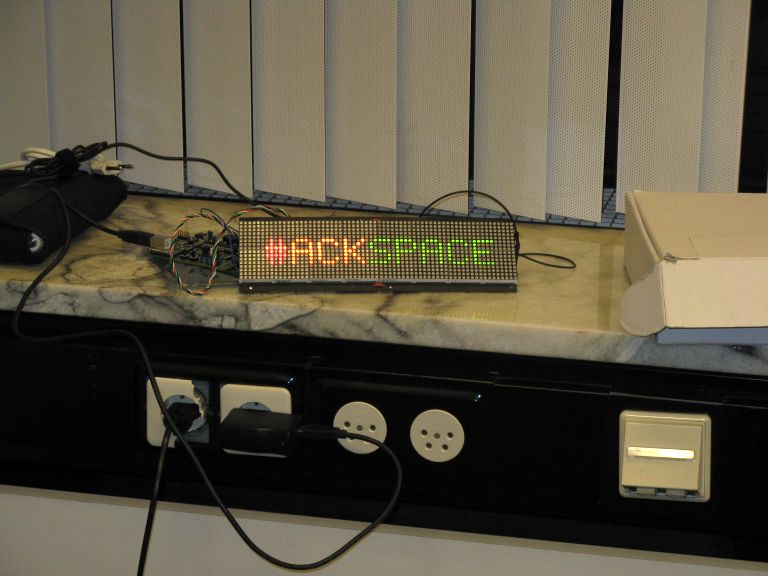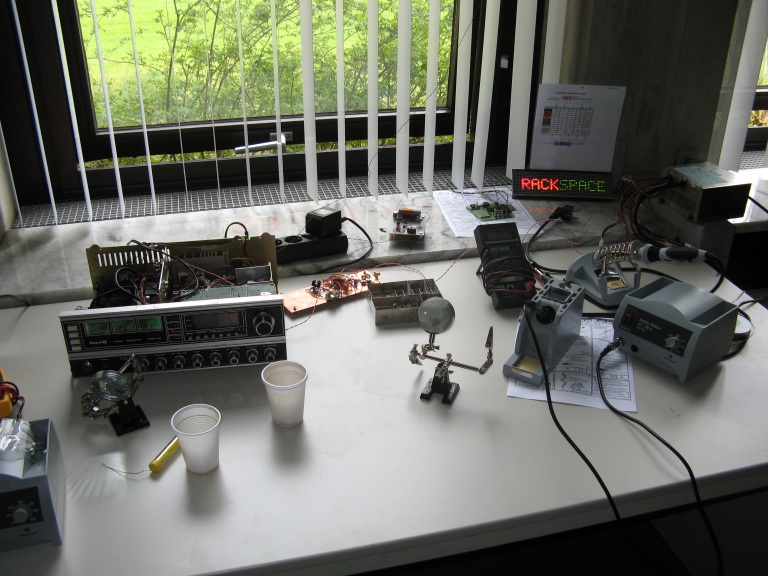Difference between revisions of "DE-DP14112"
m (fixed media location using filepath) |
m (added fuse group) |
||
| Line 1: | Line 1: | ||
{{Project | {{Project | ||
| + | |Featured=No | ||
|State=Completed | |State=Completed | ||
|Members=xopr | |Members=xopr | ||
| Line 9: | Line 10: | ||
=== synopsis === | === synopsis === | ||
| − | [[User:Xopr|xopr]] bought two 32x16 bicolor 3mm dot matrix displays (located in the slackspace running [https://en.wikipedia.org/wiki/Conway%27s_Game_of_Life Conway's game of life]) | + | [[User:Xopr|xopr]] bought two 32x16 bicolor 3mm dot matrix displays (located in the slackspace running [https://en.wikipedia.org/wiki/Conway%27s_Game_of_Life Conway's game of life], connected to fuse group [[Fuse group::B]]). |
The display is sold by Sure electronics and is driven by [[Media:Holtek HT1632C.pdf|Holtek HT1632C]] IC's and controlled by an Arduino nano. They also have written a [[Media:Sure Electronics 3216 Bicolor LED.pdf|manual]] | The display is sold by Sure electronics and is driven by [[Media:Holtek HT1632C.pdf|Holtek HT1632C]] IC's and controlled by an Arduino nano. They also have written a [[Media:Sure Electronics 3216 Bicolor LED.pdf|manual]] | ||
Latest revision as of 12:26, 17 January 2018
| Project: DE-DP14112 | |
|---|---|
| Featured: | No |
| State | Completed |
| Members | xopr |
| GitHub | 3216 bicolor |
| Description | 3216 Bicolor LED 3mm Dot Matrix Display |
| Picture | |

| |
Contents
3216 Bicolor LED 3mm Dot Matrix Display
synopsis
xopr bought two 32x16 bicolor 3mm dot matrix displays (located in the slackspace running Conway's game of life, connected to fuse group B). The display is sold by Sure electronics and is driven by Holtek HT1632C IC's and controlled by an Arduino nano. They also have written a manual
There are several versions of the 3216 bicolor display which all should work with the same library:
- DE-DP14112 3mm 5v, xopr's version (not available anymore)
- DE-DP14211 5mm 5v
- DE-DP14116 3mm 12v, newer version (verified by Krilek, thanks)
The project also uses a modified version of wildstray's ht1632c library which you can find here on github.
current implementation
- The attached power supply is too weak to have all the leds lit at full brightness. Expect crashing hardware here
- The display has a jumper which allows 3 modes at boot, and 3 modes at run time; the mode is determined by first reading the jumper setting on boot, and then run-time
| jumper inside (connected to GND) | jumper outside (connected to VCC) | no jumper (N/C) | mode | |||||
|---|---|---|---|---|---|---|---|---|
| boot time | run time | boot time | run time | boot time | run time | |||
| ✓ | ✓ | messageTicker: season's greetings or music quiz banner, depending on #define | ||||||
| ✓ | ✓ | messageTicker: serial input (terminal-like) | ||||||
| ✓ | ✓ | random space invaders | ||||||
| ✓ | ✓ | game of life (fast) | ||||||
| ✓ | ✓ | game of life (normal) | ||||||
| ✓ | ✓ | game of life (slow) | ||||||
| ✓ | ✓ | test screen sequential fill | ||||||
| ✓ | ✓ | test screen random pixels | ||||||
| ✓ | ✓ | test screen stripe animation | ||||||
Note: the bold items are the ones you can 'set-and-forget'
old implementation
One of the first electronic devices on the very first day of our physical space, is the display showing ACKspace with a different prefix scrolling in vertically.
Note that the first version was driven by a myAVR kit, since Arduino wasn't that mainstream back at the time.
Photo taken on the very first day we had a physical space
Photo taken during the opening party
Here you see a LED christmas tree with the marquee on the background:
Location: slACKspace (on the microwave)
